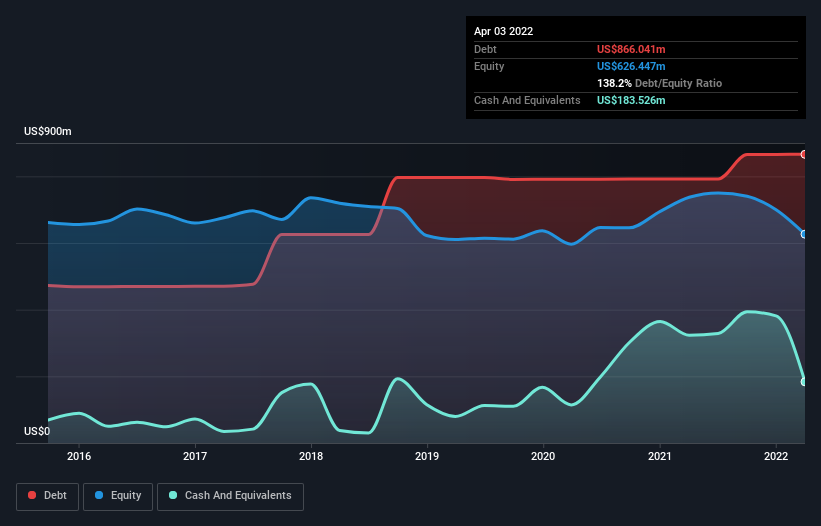
David Iben put it well when he said, 'Volatility is not a risk we care about. What we care about is avoiding the permanent loss of capital.' When we think about how risky a company is, we always like to look at its use of debt, since debt overload can lead to ruin. Importantly, Masonite International Corporation (NYSE:DOOR) does carry debt. But the more important question is: how much risk is that debt creating?
Why Does Debt Bring Risk?
Debt assists a business until the business has trouble paying it off, either with new capital or with free cash flow. If things get really bad, the lenders can take control of the business. While that is not too common, we often do see indebted companies permanently diluting shareholders because lenders force them to raise capital at a distressed price. Of course, debt can be an important tool in businesses, particularly capital heavy businesses. When we think about a company's use of debt, we first look at cash and debt together.
Check out our latest analysis for Masonite International
How Much Debt Does Masonite International Carry?
The image below, which you can click on for greater detail, shows that at April 2022 Masonite International had debt of US$866.0m, up from US$791.6m in one year. However, because it has a cash reserve of US$183.5m, its net debt is less, at about US$682.5m.

How Healthy Is Masonite International's Balance Sheet?
The latest balance sheet data shows that Masonite International had liabilities of US$372.2m due within a year, and liabilities of US$1.16b falling due after that. Offsetting this, it had US$183.5m in cash and US$411.4m in receivables that were due within 12 months. So it has liabilities totalling US$935.8m more than its cash and near-term receivables, combined.
While this might seem like a lot, it is not so bad since Masonite International has a market capitalization of US$2.03b, and so it could probably strengthen its balance sheet by raising capital if it needed to. But it's clear that we should definitely closely examine whether it can manage its debt without dilution.
We measure a company's debt load relative to its earnings power by looking at its net debt divided by its earnings before interest, tax, depreciation, and amortization (EBITDA) and by calculating how easily its earnings before interest and tax (EBIT) cover its interest expense (interest cover). This way, we consider both the absolute quantum of the debt, as well as the interest rates paid on it.
Masonite International's net debt is sitting at a very reasonable 1.7 times its EBITDA, while its EBIT covered its interest expense just 7.0 times last year. While that doesn't worry us too much, it does suggest the interest payments are somewhat of a burden. One way Masonite International could vanquish its debt would be if it stops borrowing more but continues to grow EBIT at around 15%, as it did over the last year. When analysing debt levels, the balance sheet is the obvious place to start. But ultimately the future profitability of the business will decide if Masonite International can strengthen its balance sheet over time. So if you want to see what the professionals think, you might find this free report on analyst profit forecasts to be interesting.
Finally, a company can only pay off debt with cold hard cash, not accounting profits. So we always check how much of that EBIT is translated into free cash flow. During the last three years, Masonite International produced sturdy free cash flow equating to 53% of its EBIT, about what we'd expect. This free cash flow puts the company in a good position to pay down debt, when appropriate.
Our View
Masonite International's EBIT growth rate was a real positive on this analysis, as was its interest cover. Having said that, its level of total liabilities somewhat sensitizes us to potential future risks to the balance sheet. When we consider all the elements mentioned above, it seems to us that Masonite International is managing its debt quite well. But a word of caution: we think debt levels are high enough to justify ongoing monitoring. The balance sheet is clearly the area to focus on when you are analysing debt. However, not all investment risk resides within the balance sheet - far from it. These risks can be hard to spot. Every company has them, and we've spotted 2 warning signs for Masonite International (of which 1 is significant!) you should know about.
If, after all that, you're more interested in a fast growing company with a rock-solid balance sheet, then check out our list of net cash growth stocks without delay.
New: Manage All Your Stock Portfolios in One Place
We've created the ultimate portfolio companion for stock investors, and it's free.
• Connect an unlimited number of Portfolios and see your total in one currency
• Be alerted to new Warning Signs or Risks via email or mobile
• Track the Fair Value of your stocks
Have feedback on this article? Concerned about the content? Get in touch with us directly. Alternatively, email editorial-team (at) simplywallst.com.
This article by Simply Wall St is general in nature. We provide commentary based on historical data and analyst forecasts only using an unbiased methodology and our articles are not intended to be financial advice. It does not constitute a recommendation to buy or sell any stock, and does not take account of your objectives, or your financial situation. We aim to bring you long-term focused analysis driven by fundamental data. Note that our analysis may not factor in the latest price-sensitive company announcements or qualitative material. Simply Wall St has no position in any stocks mentioned.
About NYSE:DOOR
Masonite International
Designs, manufactures, markets, and distributes interior and exterior doors and door solutions for the new construction and repair, renovation, and remodeling sectors of the residential and non-residential building construction markets worldwide.
Adequate balance sheet and fair value.
Similar Companies
Market Insights
Community Narratives




